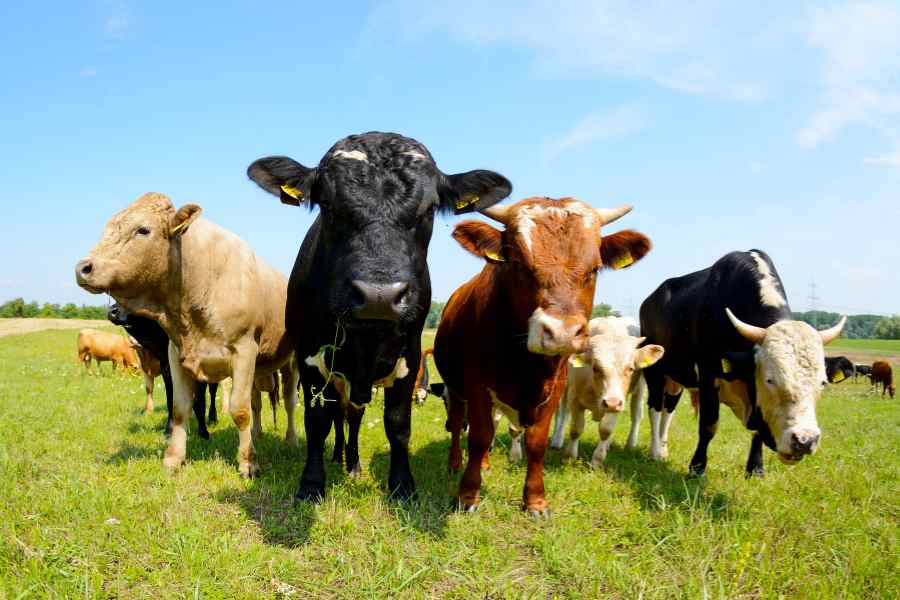When it comes to fertility nutrition, not all meats are created equal. Ruminant animal meat, from cows, sheep, goats, and deer, offers distinct advantages over meats from monogastric animals like pigs and chickens. The unique digestive systems of ruminants not only enhance the nutrient quality of their meat but also result in a fat composition that aligns well with optimal health and fertility needs. Here’s why ruminant meat is superior and why it’s considered a top fertility food.
1. Ruminant Digestive System: Unique Processing by the Microbiome
Ruminant animals have a complex, multi-chambered stomach that allows them to digest fibrous plant material efficiently. This digestive system is fundamentally different from the single-chambered (monogastric) systems found in pigs, chickens, and humans. Here’s how it makes a difference:
- Microbiome Processing: In ruminants, plant material is broken down by an extensive microbiome in their rumen, the first stomach chamber. These microbes ferment and transform fiber-rich plants into nutrients that are more bioavailable to humans, including beneficial fatty acids and vitamins.
- Natural Conversion of Nutrients: The ruminant microbiome enables these animals to convert plant-based compounds into beneficial nutrients, including higher levels of omega-3 fatty acids and conjugated linoleic acid (CLA), both of which support reproductive health and reduce inflammation.
By contrast, monogastric animals like chickens and pigs cannot ferment fibre-rich plants in this way, and their fat composition reflects a higher intake of grains and oils, often resulting in higher levels of linoleic acid, an inflammatory omega-6 fatty acid.
2. Fat Composition: Ideal Ratios with Less Linoleic Acid
One of the most significant differences between ruminant and monogastric meats is the fat composition. The unique digestive process in ruminants results in healthier fats that support hormone health and reduce inflammation.
- Lower Linoleic Acid: Ruminant meat naturally contains lower levels of linoleic acid, an omega-6 fatty acid that, in excess, can promote inflammation and disrupt hormonal balance. In contrast, pork and poultry, due to their grain-based diets, tend to have higher levels of linoleic acid, which can promote inflammation in the body.
- Ideal Saturated and Monounsaturated Fats: Ruminant meat is rich in saturated and monounsaturated fats, which are beneficial for hormone production and cellular health. These fats serve as building blocks for reproductive hormones, making ruminant meat an ideal choice for fertility support.
For individuals focused on reducing inflammation and optimizing fertility, the fat profile in ruminant meat is more aligned with these goals than that in monogastric meats like pork and poultry.
3. Nutrient Density: Packed with Vital Fertility-Supporting Nutrients
The nutrient profile of ruminant meat is exceptionally dense, with essential vitamins and minerals that are easily absorbed due to the ruminant’s unique digestive system. Some of the key nutrients include:
- High-Quality Protein: Essential for tissue repair, cellular growth, and maintaining hormonal health.
- Iron and B Vitamins (especially B12): Crucial for red blood cell production, DNA synthesis, and energy metabolism. Heme iron in ruminant meat is highly bioavailable, supporting oxygen transport and energy production, which are crucial for egg and sperm health.
- Zinc: Essential for immune function and hormonal health. Zinc helps regulate the production of estrogen and progesterone, key hormones in fertility.
These nutrients are foundational for reproductive health and provide a strong basis for hormonal balance, making ruminant meat an ideal choice for those aiming to boost fertility.
4. Omega-3 Fatty Acids and Conjugated Linoleic Acid (CLA): Natural Anti-Inflammatories
Grass-fed ruminant meat offers significant amounts of omega-3 fatty acids and conjugated linoleic acid (CLA), which are beneficial for reducing inflammation and supporting overall metabolic health.
- Omega-3s for Anti-Inflammation: The omega-3 content in ruminant meat helps combat inflammation, which is essential for a fertile environment. Omega-3s help modulate immune function, promote regular menstrual cycles, and improve conditions like PCOS that can impair fertility.
- CLA for Insulin Sensitivity: CLA supports insulin sensitivity, which helps maintain stable blood sugar levels and promotes hormonal balance. Stable blood sugar is essential for optimal ovarian function, making CLA an indirect but powerful fertility enhancer.
These fatty acids provide a natural anti-inflammatory effect that benefits reproductive health in ways monogastric meat cannot match due to its higher linoleic acid content.
5. Mitochondrial Support: Boosting Cellular Energy
Ruminant meat provides nutrients that directly support mitochondrial health, which is crucial for fertility. Mitochondria generate energy for cells, and their function is vital for egg health as eggs require high energy levels for division and early embryonic development.
- Nutrients for Mitochondrial Health: Ruminant meat contains coenzyme Q10, carnitine, and creatine, all of which help boost mitochondrial energy production and maintain cellular health.
- Egg Quality Enhancement: By improving mitochondrial function, the nutrients in ruminant meat support high-quality egg development, a fundamental factor in successful conception.
6. Supporting Thyroid and Adrenal Health with Bioavailable Minerals
The minerals in ruminant meat are essential for thyroid and adrenal health, both of which play key roles in reproductive function.
- Iron, Selenium, and Iodine: Ruminant meat contains easily absorbed forms of iron, selenium, and iodine, which are necessary for thyroid function. The thyroid regulates metabolism and is closely linked to menstrual cycle regularity and hormone production.
- Why It Matters for Fertility: Low thyroid function can lead to irregular periods, ovulation issues, and difficulty conceiving. The minerals in ruminant meat support optimal thyroid health, promoting a balanced hormonal environment conducive to conception.
7. Blood Sugar Balance: A Foundation for Hormonal Stability
With its high protein and fat content, ruminant meat helps stabilize blood sugar levels, which is essential for hormonal health and fertility. Unlike high-carbohydrate foods or fats rich in linoleic acid, the fats in ruminant meat help maintain a stable blood sugar level.
- Insulin Regulation: Stable blood sugar reduces the risk of insulin resistance, a condition that can disrupt ovulation and lead to PCOS, a common cause of infertility. Consistent blood sugar also minimizes stress on the adrenal glands, further promoting hormonal stability.
By supporting stable blood sugar, ruminant meat creates a more balanced hormonal environment that enhances fertility naturally.
Conclusion
Ruminant meat stands out as a fertility superfood for its nutrient density, ideal fat composition, anti-inflammatory properties, and mitochondrial support. The unique digestive system of ruminant animals allows them to transform plant material into nutrient-rich meat, with a fat profile lower in inflammatory linoleic acid and higher in beneficial omega-3s and CLA.
The complex interplay of nutrients and healthy fats in ruminant meat aligns well with the nutritional needs for fertility, making it a superior choice over monogastric meats like pork and poultry. For those seeking to enhance their fertility naturally, incorporating ruminant meat into a balanced diet could be a valuable and impactful choice.





